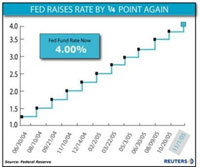|
 |
| The Federal Reserve on Tuesday raised interest
rates to the highest in four years and signaled it still had leeway
to tighten monetary policy, while data showed factories ran at a
robust pace in October. |
The Federal Reserve on Tuesday pushed its target
interest rate up to 4 per cent, highlighted concerns about inflation and
said it expected to continue tightening monetary policy.
The policymaking Federal Open Market Committee repeated its judgment
that, following the increase, monetary policy still remained accommodative and said it expected to
continue raising rates at a "measured" pace. It was the 12th consecutive
quarter point rate increase, stretching back to June of last year.
Financial market reaction was limited after a decision that was widely
expected, with a slight drop in bond prices and rises in stocks and the
dollar.
The Fed said that high energy prices and hurricane-related disruptions
had temporarily depressed output and employment.
"Monetary policy accommodation, coupled with robust underlying growth
in productivity, is providing ongoing support to economic activity that
will likely be augmented by planned rebuilding in the hurricane-affected
areas," the FOMC statement said.
It again highlighted inflation risks, saying the "cumulative rise in energy and other costs
have the potential to add to inflation pressures" while adding that
core inflation and longer-term
inflation expectations remained contained.
The stress on cumulative energy price increases adds to the impression
that a chief concern is a potential pass-through to core inflation after a
sustained climb in the oil price.
The impact on core inflation has been limited to date. But the 2 per
cent rise in the Fed's preferred measure of core inflation in the two
months to September is already at the top of the 1-2 per cent "comfort
range" popularised by former Fed governor Ben Bernanke.
Mr Bernanke has been nominated to replace Alan Greenspan as Fed
chairman. There will be two more meetings of the FOMC, in December and
January, before Mr Greenspan is scheduled to step down.
The Fed's vote to raise interest rates and signal its intention of
continuing to raise rates came in a unanimous vote.
While some Fed policymakers think the notion of removing policy
accommodation is stale, the current outlook retains majority support among
the committee.
At 4 per cent, the federal funds rate is no longer obviously a long way
below the so-called "neutral" level where monetary policy neither restricts nor
stimulates the economy.
(Agencies) | 